You made all the right moves in a Risk game. You set yourself next to the most ideal continents. You created conflicts between other players and watched them as they fought each other. You thought only in a few turns you will collect enough armies for your large continent that you will emerge as a new world power. Suddenly, out of no where, a new player started to invade one player after another and got more and more powerful every turn. He conquered one player a turn until your turn was up. He eliminated you and went on to win the game! Sound familiar? This is commonly known as ‘the chain effect’.
A series of elimination moves by a Risk player can lead him to victory much easier than collecting armies for continents or staying in isolation for a long period of time. You need to make sure that you are not caught up in this, while at the same time, know when to take advantage of it when the opportunity comes.
As you may know, learning by example is perhaps one of the best ways to learn new techniques. This walkthrough shows you ' the chain effect’. The Risk game presented here was played between 6 players starting from random locations.
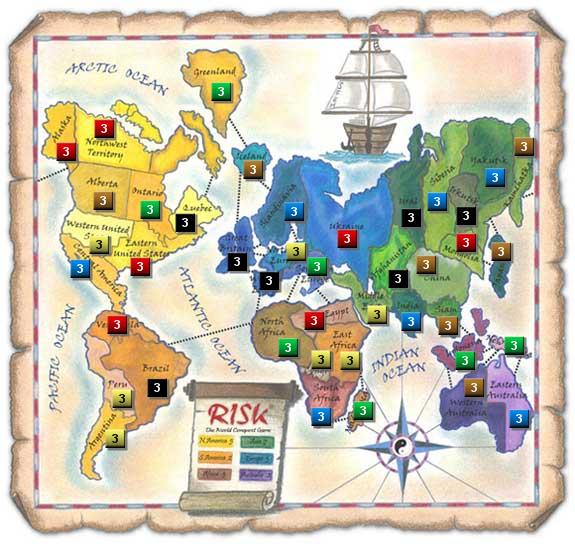
After a while, player settled into their preferred continents. Red was going for North America, while Yellow secured South America and is interested in Africa. Green had Australia and was focusing on North America for further expansion. Blue was still undecided.
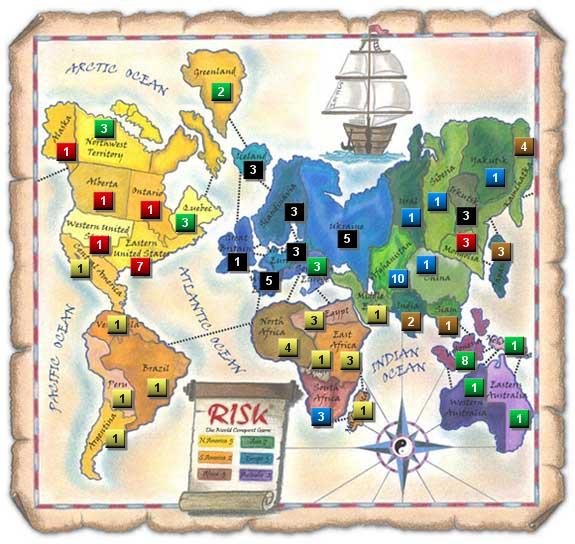
At this point, Red made a wise move. Red removed Green from North America effectively eliminating Green control in this region. Now Green had to focus on other parts of the world which indirectly benefited Red. Blue was making a move for Africa.
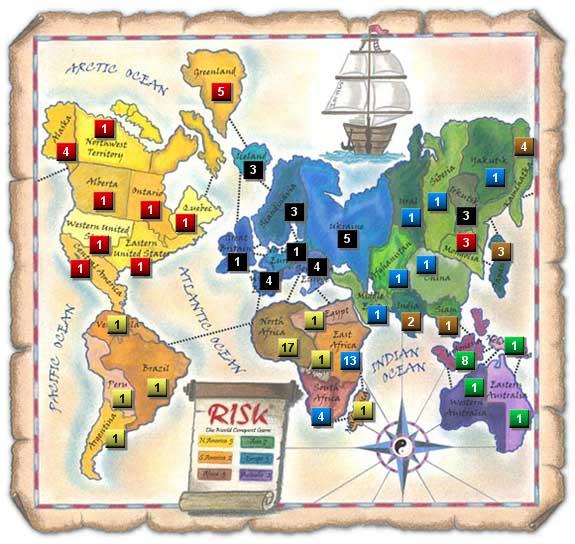
A major change occurred at this point. Yellow cashed cards and seized the opportunity to get Europe counting on promises by Blue that he will not attack South America. The weak Black in Europe cashed cards and had the option of retaliation to fight the invading Yellow. Instead, Black made a better move. Black eliminated Green, got his cards and secured Australia, effectively leaving Europe for Yellow.
Yellow was pleased with the results at this point as he expected more difficulty in his compaign. Little he knew that he had started a ‘chain effect’.
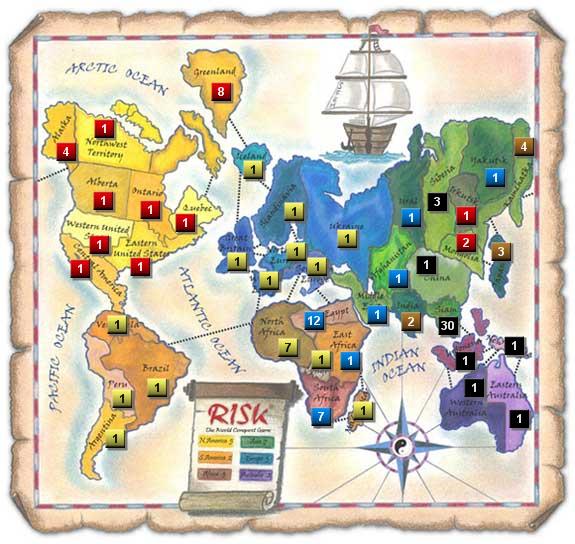
Blue took advantage of this opportunity and thought that this must be his chance. He invaded Europe and even North America. His thinking was that he should weaken both Red and Yellow since they had continents and were becoming too powerful.
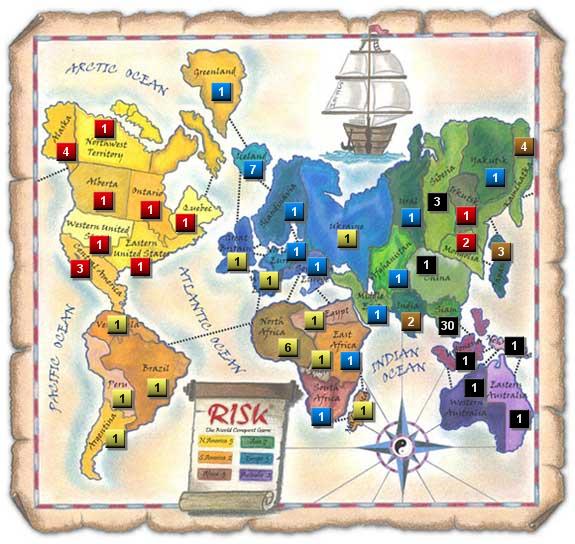
In addition, he thought he could also get Europe.
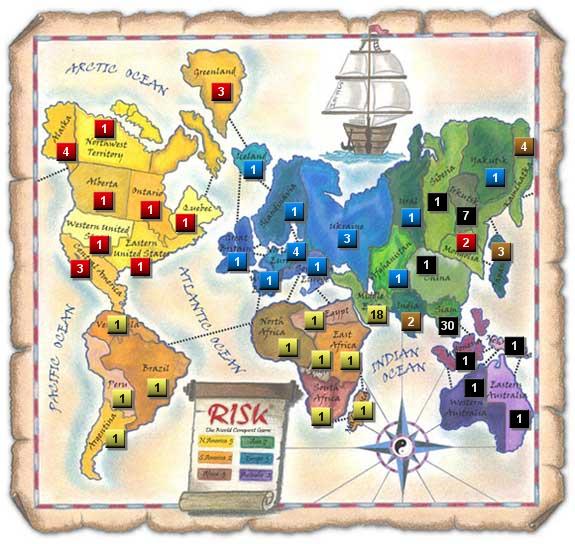
As demonstrated in the next moves, Blue’s thinking was very wrong. He underestimated the dynamics of the game and that after a certain point, elimination becomes much more important than collecting armies for continents. At this point, Black had eliminated a player and had more cards than others. Blue’s move made him weak, but he also made Yellow and Red weak all for the benefit of Black. Black could eliminate any player with ease. Everyone had three cards at least which made them a great target for elimination. Black made a right move and eliminated Blue, cashed cards, then eliminated Red, cashed cards again and then eliminated Yellow.
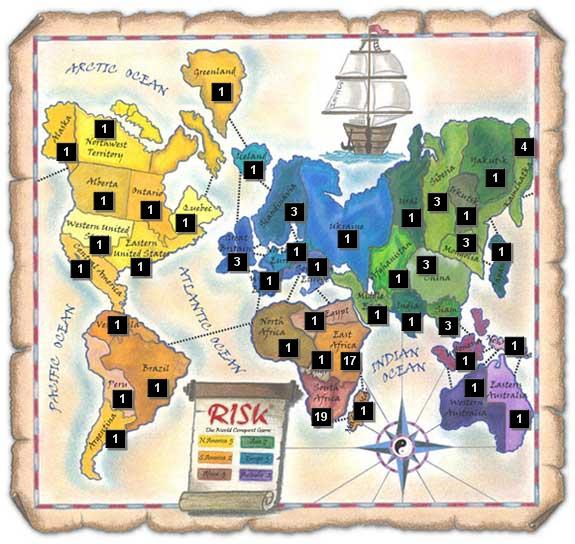
Conclusion
Blue, Red and Yellow were responsible for their own downfall. By engaging in a useless conflict, they made it easier for Black to take advantage of them. They also failed to realize what was happening and carried on with their conflict (Blue’s move) regardless of the emergence of new powers in the game. Black could have easily been removed if Blue, Red and Yellow were content with their own continents. More engaging diplomacy was needed in the game to resolve matters between them before they got out of hand. Another lesson learnt is that isolation is not always beneficial. Red stayed out of the conflict hoping that the war between Yellow and Blue will make them both weak. The end effect was that he was not in a position to eliminate weak players and others could benefit from this (like Black). Those who benefited came back for him in the end.
Tip: You should only make others weak if you want to take them out yourself. Otherwise, you are making it easy for other players to take weak players out and receive the profit.